QuestionHe isn ot overweight, at the moment I think he is just finding his boundries and getting used to his new surroundings. I think if the clumsy landings continue to be a problem then I may be back! Quick point, is it safe to leave him out overnight if he refuses to go back in. This is a last resort though! Just in case
Thank you so much, I am going to put into practice the advice you have offered and will recommend your site to all who needs assistance. Hopefully I will be back soon with good news!
Huge Thanks
Louise
-------------------------
Followup To
Question -
Thank you so much for the detailed response.
I do feel quite honored that he likes to come out of his cage as his previous owners said he was really aggressive and unresponsive with them. This has enforced the resons why I took him.
I really dont want to get his wings clipped, its something I dont feel comfortable with. he is not the most elegant of birds but then greys aren't know to be! My main concern is him hurting himself when I try to put him in his cage. Without his wings clipped he just flies off when I put my hand to him and sometimes makes clumsy landings. I just really want a humane way of putting him back without having to stay up until the early hours of the morning!
When on my hand, each time I get him anywhere near the cage he grabs onto the bars and climbs on top rather than in. I guess its quite flattering really that he wants to stay with me! And in all honesty I admit I am rather reluctant to be bitten. His previous owners had some scars from this before. Perhaps he senses this?
Thank you yet again
Louise
-------------------------
Followup To
Question -
"Hi, Firstly, hats off to you all for the wonderful site, help and advice.
I have just taken on a 3 year old African Grey from a family who could no longer give him the time he deserves. He is beauftiful and we love him already. I have had him a week and a half now. At first he lunged each time my hand was near the cage and lunged when I changed his food or cleaned his cage. I am now able to perfom these tasks with minimal lunging! He will gladly take treats from my hand thorugh the bars but remains v territorial of his cage,l which I understand. I read somewhere that perhaps it is better to train territorial birds outside their cages. Last night I opened up his door and out he came, great! He flew onto my shoulder and as I have been told that they should not do this at first due to the dominance issue I put my hand under his belly to get him to step up and he bit me. I then gently shook him from my should and he flew off. He did continue to fly to us for company and seemed ok. However, he refused to return to his cage. Bribes, commands failed
to work. In the end at 2am this morning I managed to gently ease him in using a cushion when he landed on it. Not ideal and possibly stressful! My main issues! 1 - Is it too early to let him out of his cage and should I persist hand taming him in it first? 2 - How do I get him to return to his cage without stressing him out?. 3 - How can I hand tame a lunging (and biting if given the chance) bird within his beloved cage)! Sorry about the essay but I am determined to give this bird the love and attention he needs as he has lost out over the last 3 years of his life
Huge Thanks
Louise"
Answer -
Hi, Louise. Thanks for posting!
Thanks to you for taking this grey in and loving him as he should be loved.
It is not too early to let him out of his cage. I'm actually surprised he's wanting to if you've only had him 1.5 weeks. Usually, 3-year old parrots have a timeframe when they initially are moved into a new environment where they are too stressed to even do anything because the environment and humans are so new and different. You cannot handtame a parrot inside it's cage.
Your new grey obviously LOVES being outside his cage. This is why he doesn't want to go back and he's biting you so you won't put him back! This is a common trait with parrots. He wants to stay out with you. How you handle this is up to you and your situation. You can either allow him to stay outside on top of his cage or playstand (if you have a playstand) at night or put him away. If you prefer to put him in his cage, you'll need to have him step up on your hand and you put him in or use a perch. The cushion was OK to use, but you need to get him used to stepping up on your hand. This might mean a bit now and then, but if you deal with a parrot, you're going to get biten now and then. You have to set the boundaries with your new grey and not let him get the upper hand. Are his wing flight feathers clipped? You might want to consider doing this/having this done so he can't get away from you when you want to work with him. Clipping feathers doesn't keep a bird from flying, but it does keep them from gaining altitude when they do fly (if done properly) so you can access him easier (so he can't fly to the top of the drapes or other where you can't reach him).
Again, you do not want to hand tame him inside his cage. Actually, it sounds like this grey is fairly hand tame already, but just needs some more time to get used to his new environment and learn about you. It sounds to me from your post that you are doing the right things with him so far. There is a theory that when/if a bird is above your eye level, it feels dominant over you. This is backed up by the fact that in their social hierarchy, birds will perch on the highest point in the area, and the "alpha" bird if you will, occupies the highest point. In a human/parrot relationship, you want to remain the "alpha" bird in the flock (yes, your parrot considers you part of it's flock). A bird's cage is it's safety zone, it's personal territory, and when you put your hand/arm inside it's cage, you are "invading" it's territory. This is why you should allow your new bird to come out of it's cage before trying to handle it. Of course, there might be times where you have to go inside to retrieve your bird, but you will get biten...even a tame bird will bite it's human when cornered inside it's cage. I have some parrots I've owned for 17 years and I still can't put my hand inside their cage in order to bring them out. I don't even try anymore because it gets neither of us anywhere...it just makes the bird more untrusting. Your goal with your grey is to establish a trusting relationship...you can do anything with a bird who trusts you. Avoid situations that might break down this trust. You might want to avoid allowing your grey to sit on your shoulder until he learns to do what you want, however, some of my birds still refuse to step up on my hand when they are on my shoulder. They know they are going to be put back in their cage, so they refuse to step up. Perhaps your grey learned this from his previous owner. Another trick parrots like to use when they don't want to leave your shoulder is that they climb to the middle of your back while holding on to your shirt/blouse at the collar in the back. Each time you try to reach them, they move to one side or the other, and it's impossible to reach them without someone's help. Sometimes they will step off if you put them close to their cage, but sometimes they don't!
When you need to service his cage and/or feed him, allow him to come out of his cage. This will eliminate the lunging (remember: avoid these type situations). Otherwise, when feeding/changing water, just stick your hand inside the cage and if/when he tries to bite/lunge, tell him "bad bird" then go about your business anyway. If he sees that his lunging isn't getting him anywhere with you, perhaps he'll stop.
If you aren't familiar with Dr. Pepperberg's work with greys, I recommend you look this up on the internet (Dr. Irene Pepperberg and Alex the grey). You can find a lot of good advice about greys. They are extremely intelligent and require much positive interaction with humans. One thing to never forget...always reward your grey for positive behavior and never reward your grey for negative behavior.
Come back with any questions.
Chrys
Answer -
Hi again, Louise.
Definitely, yes, parrots can sense fear from several feet away. The theory is they can sense how fast your heart is beating...similar to dogs, horses, etc.
One thing you can try when putting him away is once you have him on your hand/finger/perch, place/lay your other hand over his wings and swiftly move him into his cage. The point here is to keep him from flapping his wings so he can't get away from you. Also, having your hand in this location will allow you to protect his wings from getting caught in the cage door, etc. You'll be transporting him toward his cage at the same time you are covering his wings, therefore, he'll be too busy hopefully to pay attend to everything happening to him at the same time. I use this method quite often and it usually works. Once you try this a couple times it will be come easier. Of course, some smart birds will learn what you are doing and find a way around it eventually! Make sure his cage is large enough and he has plenty to do inside, i.e., you want him to want to go inside his cage. However, this parrot may be elated to have this much freedom and he'll take advantage whenever he can. When he climbs to the top of his cage when you try putting him inside, you need to take him off the top and put him inside. If he gets his way, he'll not learn that your boss. I completely understand not wanting to be biten! My arms/hands are covered with scars...I don't tolerate my parrots biting me, but they get their licks in now and again!
Clumbsy landings concern me. Is he overweight at all? Does he have any issues with his legs/feet/wing feathers?
Clipping his flight feathers is neither cruel nor harmful. Parrots can still fly with clipped flight feathers, they just can't gain altitude. This will give you more control over him. You can't put him in his cage at the end of his day if you can't catch him.
I don't know how much you know about parrots, but I have a website that provides information in general if you want to visit:
http://www.angelfire.com/falcon/birdinfo/index.html
Sounds to me like you have the makings of a really nice pet parrot.
Chrys
AnswerI'm glad I/this site can be helpful to you! This is why we're here!
It's OK to leave him out of his cage overnight if he's OK with it and you're OK with it and you don't have other pets that might try to get him. Once lights go out, birds can't see very well and roost for the night. Keep in mind though that parrots need 12 hours sleep per night, so you wouldn't want him in the same room with a TV or other that would not allow him to get the sleep he needs. I have several parrots I leave out all the time because they just don't get into anything. However, usually at night when their lights start going out (I have lights on timers and each goes off at a different time), these birds wander inside their cages on their own to sleep and then come out on their own in the morning (but sometimes they sleep on top of their cages). Your bird might do the same once he gets used to the routine. Right now I think he's so grateful to be allowed out of his cage that he might stay outside for a while. As a matter of fact, it might be good to leave him out (this depends on the individual bird). It may help him accept his new environment and you. If he's been used to being in his cage all the time in the past, and didn't enjoy this, and now enjoys this freedom, he will likely associate this new freedom with you and help to establish a bond/trust with you. However, I wouldn't allow him to stay outside his cage when no one is at home, at least until you both get to know each other better. You can test this though by allowing him to stay out on his own for short periods of time, such as when you go to the corner drug store and are only gone for short periods of time. However, this can backfire, too! Parrots left out unsupervised can destroy wood furniture, wood around windows/doors, they can chew electric cords, get into all sorts of things, etc....in other words, they can get into all sorts of trouble on their own (and even die in the process). You have to know the bird first before doing this on a regular basis.
Definitely keep me informed on your progress.
Chrys

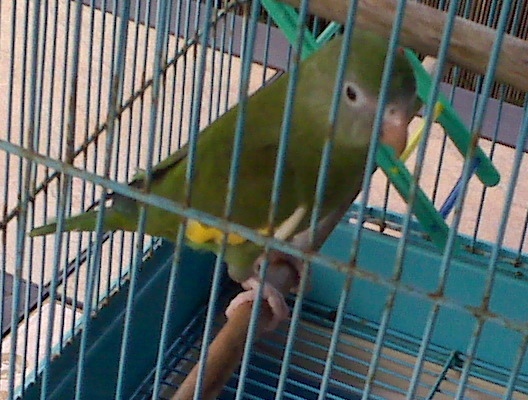 What type of parrot is this?
Question
Friendly bird
A week ago ths small parrot flew
What type of parrot is this?
Question
Friendly bird
A week ago ths small parrot flew
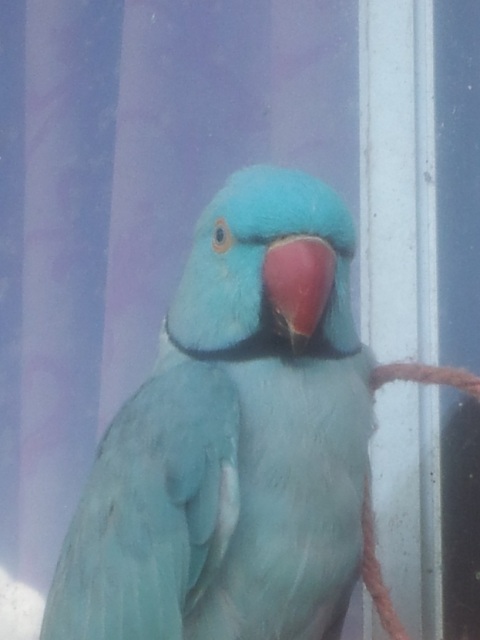 RE: Indian Ringneck probems
Question
Indy our Ringneck
Thank you for your he
RE: Indian Ringneck probems
Question
Indy our Ringneck
Thank you for your he
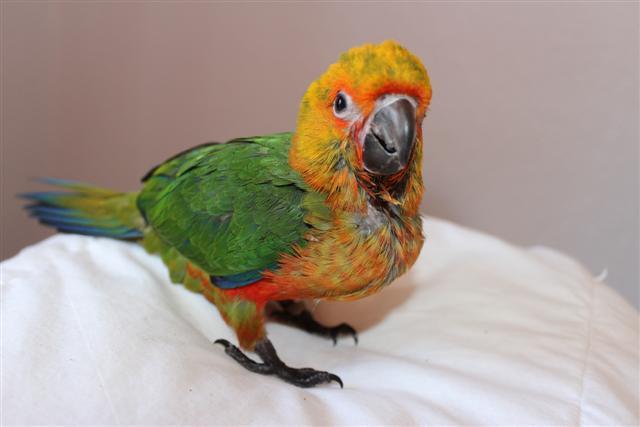 Jenday Conure Weaning?
Question
Castor the Conure
Hi
I have a 9 week o
Jenday Conure Weaning?
Question
Castor the Conure
Hi
I have a 9 week o
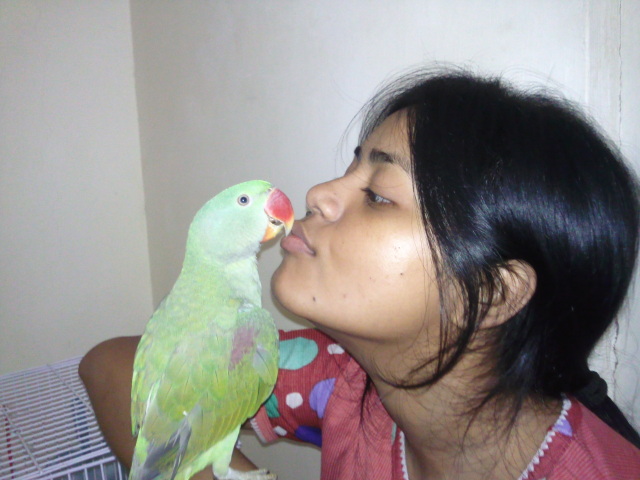 can i give my parrot chole(chana) called in hindi
Question
my little chaddi alexa
dear sir,
can give chan
can i give my parrot chole(chana) called in hindi
Question
my little chaddi alexa
dear sir,
can give chan
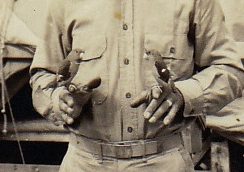 ID Birds
Question
Panama Birds
My uncle served in Panama in 1941
ID Birds
Question
Panama Birds
My uncle served in Panama in 1941